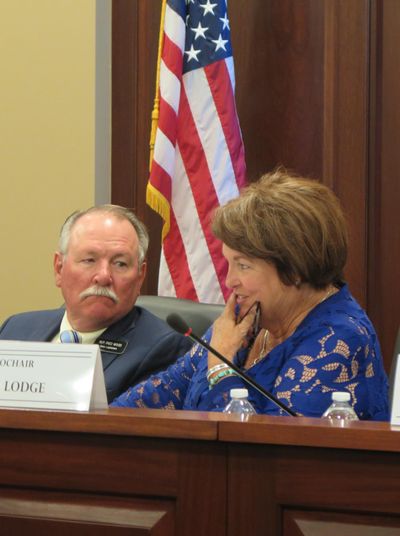Lawmakers: Idaho ‘uniquely poised’ to stiffen campaign, lobbying disclosure requirements

BOISE – Idaho is “uniquely poised” to make major improvements in its public disclosure system, state lawmakers on a special panel said Monday, from requiring more and more frequent reports from candidates, lobbyists and PACs to modernizing and upgrading the state’s online reporting system.
“There’s a real sense or a sentiment in the Legislature that we need to do a better job of disclosure and sunshine,” said Rep. Fred Wood, R-Burley, co-chair of the Idaho Legislature’s ethics and campaign finance working group. “So I think there’s an opportunity here.”
With state revenues coming in strong and well ahead of forecasts, Idaho could fund a major improvement to the Idaho Secretary of State’s reporting and disclosure system that could be easy for candidates to use, and easy for citizens to access, he and other lawmakers said – and give them real-time information about who’s spending how much for what in politics in Idaho. But the state will need significant system upgrades to do it.
“We’ve got money and we’ve got the will,” Wood said. “And when we’ve got those two things, we can accomplish a lot – and we want to do that while the iron’s still hot.”
Idaho Secretary of State Lawerence Denney, Idaho Association of Commerce and Industry President Alex LaBeau, lobbyist Elizabeth Criner, who chairs the Idaho Legislative Advisers, and Ada County Chief Deputy Clerk Phil McGrane all urged the panel to propose additional reporting requirements, and the five senators and five representatives on the panel were mostly receptive.
“I think this is going in the right direction,” said Sen. Todd Lakey, R-Nampa.
Rep. Tom Loertscher, R-Iona, sounded a note of caution. “Some of these fixes are pretty good, if we get ‘em right, if we do ‘em the right way, and try not to make them too burdensome on candidates,” he said. “We don’t want to make it such a burden that it’s undoable, because then that automatically creates a hindrance for people who are interested in running for office. … The more complicated we make it, the more difficult it’s going to be to get people to run. ‘Cause there are a certain number of folks who say, ‘It’s too much detail, too much hassle for me – I’m just not going to do it.’”
House Minority Leader Mat Erpelding, D-Boise, responded, “If campaign finance requirements are limiting people from running because it seems burdensome, I guess I’m OK with those people not running for office. Because if transparency is what we’re advocating for here, then this should be a very simple expectation, that you put forward what you spend, and you put forward what you bring in for money as a contribution.”
Among the ideas the panel is considering recommending to next year’s Legislature:
- - Requiring campaign finance reporting for all local elections, whether for candidates or for ballot measures, whenever $500 or more has been raised or spent. Many local elections in Idaho currently don’t fall under reporting requirements.
- - Increasing the frequency of campaign finance reporting to monthly during election years and twice a year in non-election years.
- - Placing new reporting requirements on political action committees, or PACs, including forbidding them from accepting more than $1,000 per election cycle from any entity, in or out of state, that doesn’t also file its own Idaho disclosure reports; and requiring PACs to disclose not only their treasurer but also who the decision-makers are behind the group.
- - Requiring lobbyists to report their expenditures year-round, rather than just during the legislative session.
- - Reconsidering fines for reporting violations, and possibly raising them, to ensure they deter violators.
Lobbyists themselves want more disclosure requirements, LaBeau and Criner told the lawmakers.
“We want a level playing field,” said LaBeau, who represents a major business lobbying group and also operates a PAC that’s active in campaigns. “Trying to play hide the ball doesn’t do anybody any good. … It really it paints a black eye on the state of Idaho.”
Loertscher distributed a proposal for a very basic personal financial disclosure requirement for Idaho officials, based on what’s already required for state legislators in Utah. “I think we are charged with coming up with something on this committee,” he said; he based his proposal on a conflict of interest and financial disclosure form that Utah House members are required to file.
Idaho currently is one of just two states with no personal financial disclosure requirements for state legislators or any other elected or appointed officials; that’s one key reason Idaho frequently ranks very low in national comparisons of ethics laws.
“People are looking for us to come up with some way that legislators have to declare what they do otherwise outside the Legislature, to try to eliminate any conflicts of interest as best we can,” Loertscher said. “This is probably the most innocent thing that I’ve seen. It’s not a lot, but it at least lets people know what we do for a living, and how that might affect our actions in the Legislature.”
The form requires lawmakers to disclose their primary employer and occupation or job title; all entities they own or for which they’re an officer; each entity that has paid them $5,000 or more in income in the past year; each entity in which they own stocks or bonds valued at more than $5,000, unless they’re managed by a third party; any boards on which they serve; real property they own that could create a conflict of interest; and their spouse’s name, occupation and employer.
“It’s not terribly invasive,” Loertscher said. “It’s not a lot, but it is something I think moves the bar a little.” And because potential conflicts of interest then would be a matter of public record, he said, there might be fewer times that lawmakers would need to declare potential conflicts as they’re voting on bills.